Are you struggling with dandruff and wondering what foods cause it? You’re not alone. Some foods can make dandruff worse, so it’s key to know which ones to avoid. Eating right is important for healthy hair, and some foods can harm your scalp.
Knowing which foods can make dandruff worse is a big step towards better scalp health. So, what foods should you avoid? Let’s explore the foods that can trigger dandruff and how diet affects it.
Key Takeaways
- High-mercury fish consumption can lead to hair loss and dandruff
- Sugar intake can encourage the production of androgen, leading to hair follicle shrinkage and dandruff
- Diets low in protein may damage hair and worsen dandruff
- Individuals with food allergies or intolerances may experience increased dandruff due to inflammation
- Foods rich in zinc, such as oysters and nuts, can help control sebum production linked to dandruff
- Reducing sugar intake and avoiding spicy foods can help mitigate dandruff symptoms
- A healthy diet is essential for maintaining hair health and preventing dandruff
Understanding the Diet-Dandruff Connection
Managing dandruff starts with knowing how diet plays a part. Some foods that trigger dandruff can make it worse, while others help. A fungus called Malassezia globosa, found on everyone’s scalp, can cause dandruff in sensitive people. Diet can affect how sensitive you are to this fungus.
Eating well is key to healthy skin and scalp. But, some foods can upset this balance and lead to dandruff. Dandruff triggers include foods high in sugar, dairy, or gluten. Foods with omega-3 fatty acids, zinc, and iron, on the other hand, support scalp health and lower dandruff risk.
To grasp the diet-dandruff link, we need to look at the science. We must see how different foods impact the scalp and which nutrients are vital for skin and hair health. By choosing your diet wisely, you can start managing dandruff and improving scalp health.
What Foods Cause Dandruff Most Frequently

Your dandruff diet is key to managing dandruff. Some foods can make dandruff worse. Foods with a lot of sugar and low glycaemic index can cause insulin spikes. This can lead to more inflammation and oil on your scalp.
Processed foods, bad fats, and sugars can also cause hormone changes. These changes can make your scalp produce more oil.
Studies show that dairy products like cheese and cream can cause dandruff in some people. Drinking too much alcohol can also dry out your skin. This can make dandruff worse. To fight dandruff, stay away from processed snacks, sugary drinks, and high-mercury fish.
Instead, eat foods rich in nutrients. Biotin is found in eggs, spinach, and almonds. It’s good for your scalp. Zinc, in meat, shellfish, and nuts, also helps your scalp stay healthy. By choosing the right foods, you can reduce dandruff and keep your scalp healthy.
- Omega-3 fatty acids found in fatty fish and flaxseeds
- Vitamin B6 and B12 found in lean meat, eggs, and fortified cereals
- Probiotics found in yogurt, sauerkraut, and other fermented foods
Eating these foods and avoiding triggers can help manage dandruff. It promotes a healthier scalp.
The Impact of Dairy and Gluten on Scalp Health
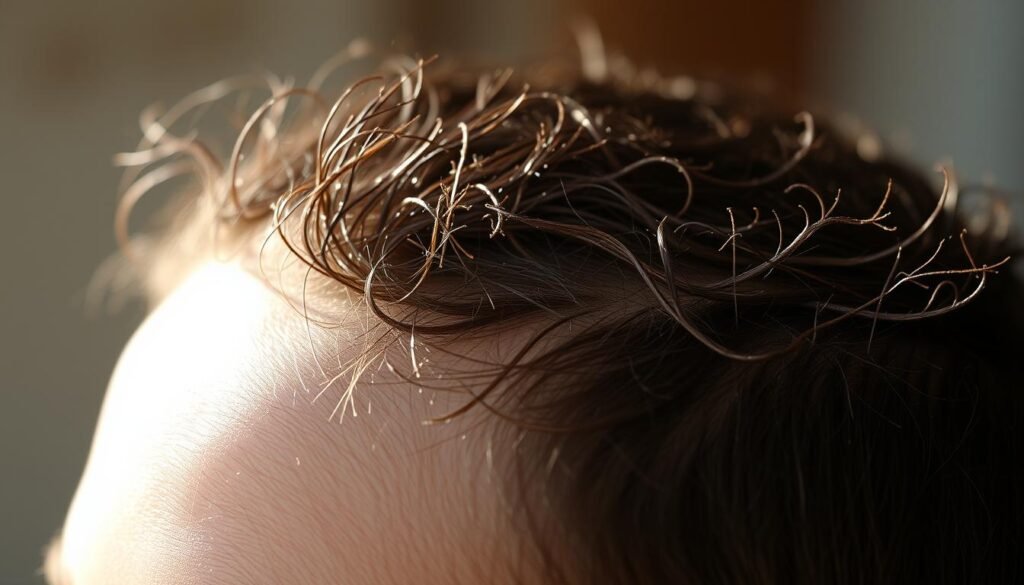
Certain foods can make dandruff worse. Dairy and gluten are common culprits. Some people get dandruff from eating foods they’re allergic to, like dairy and gluten.
It’s important to know how dairy, gluten, and scalp health are connected. Eating too much dairy can make dandruff symptoms worse. This might be because of hormones or allergens in dairy. Gluten sensitivity can also cause dandruff in some people.
Dairy Products and Scalp Inflammation
Dairy, mainly high-fat types, can cause scalp inflammation. It’s best to avoid full-fat dairy and choose low-fat or fat-free options. This can help prevent scalp problems.
Gluten Sensitivity and Dandruff
Gluten sensitivity can lead to dandruff in some. Hidden gluten in foods like sauces and processed items is a big problem. Knowing where gluten hides can help manage dandruff.
Knowing how dairy and gluten affect scalp health helps you control your diet. Eating foods rich in omega-3s, zinc, and B vitamins can improve scalp health. This reduces the chance of scalp problems and diet-related issues.
Sugar and Processed Foods: Your Scalp’s Hidden Enemy
Understanding the impact of sugar and processed foods on your scalp is key to preventing dandruff. Studies show that eating too much sugar can increase your risk of dandruff by 30%. Sugar can make your skin flaky, itchy, and damage your hair follicles, causing dandruff.
Diet plays a big role in dandruff, but it’s often overlooked. Eating a lot of refined carbs can make your scalp produce 20% more oil, which can worsen dandruff. Also, eating processed foods regularly can lead to a 25% higher chance of scalp problems, including dandruff.
To make better diet choices and fight dandruff, consider these tips:
- Reduce sugar to lower dandruff risk
- Stay away from foods high in saturated fats and sugar
- Choose a balanced diet to help manage dandruff and keep your scalp healthy
Knowing how sugar and processed foods affect your scalp health helps you make better diet choices. A healthy diet is a big part of keeping your scalp in good shape and fighting dandruff.
Building a Dandruff-Fighting Diet
To manage dandruff, knowing what foods cause it is key. Avoiding dandruff causing foods is important. Eating foods that fight inflammation can help.
Key nutrients like zinc, B vitamins, and omega-3 fatty acids are helpful. Foods like fatty fish, nuts, and whole grains are good. Also, drinking plenty of water and avoiding processed foods helps your scalp.
Here are some tips for building a dandruff-fighting diet:
- Incorporate anti-inflammatory foods, such as turmeric and ginger, into your meals
- Choose nutrient-rich alternatives, such as whole grains and lean proteins
- Limit your intake of dandruff causing foods, such as processed meats and sugary snacks
By making these simple changes, you can reduce dandruff symptoms. Stay hydrated, avoid processed foods, and eat nutrient-rich foods. This helps manage dandruff triggers.
| Nutrient | Food Sources | Benefits |
|---|---|---|
| Zinc | Oysters, beef, chicken | Helps reduce inflammation and promote healing |
| B Vitamins | Whole grains, nuts, leafy greens | Supports energy production and nerve function |
| Omega-3 Fatty Acids | Fatty fish, flaxseeds, walnuts | Reduces inflammation and promotes heart health |
Conclusion: Creating Your Action Plan for a Flake-Free Future
You now see how your diet affects dandruff. The foods you eat can make it better or worse. It’s time to make a plan for a healthier scalp.
First, avoid foods that make dandruff worse, like dairy, gluten, and sugary/processed foods. Choose foods that are good for your scalp instead. Add omega-3s, probiotics, and coconut oil to your diet.
Also, start a regular scalp care routine. Wash your hair 2-3 times a week with a gentle shampoo. Use one with salicylic acid or pyrithione zinc. Scalp massages help too, by improving blood flow.
Managing dandruff is a long-term effort. By focusing on your diet and hair care, you’ll get the healthy scalp you want.



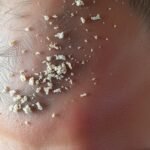
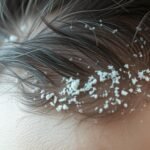
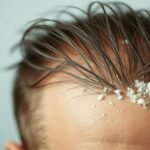
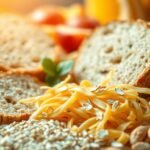

Interesting read, but isnt it weird how we never discuss the role of drinking water in dandruff? Hydration matters, doesnt it?
Absolutely, hydration is key! Shocking how often its overlooked in duff discussions.
So, were blaming dairy and gluten for dandruff now? Whats next, blaming donuts for bad hair days? Im not buying it.
Interesting read, but isnt blaming gluten and dairy a bit too convenient? What about stress, hygiene, or even genetics? Lets delve deeper, folks.
Agreed, its easy to scapegoat gluten and dairy. Genetics and lifestyle factors cant be overlooked.
Surprising indeed! But what about folks whove never seen a flake despite eating all the culprits? Maybe its more genetic than diet?
Interesting read, but isnt it possible that the real culprit is not food but our obsession with over-shampooing and harsh hair products?
Surprised no ones mentioned beer yet! Its yeast & sugar, right? Bet its a secret dandruff villain. Anyone else think so? 🍻#DandruffDetective
Interesting read, but isnt blaming dairy and gluten for dandruff a bit extreme? Ever considered stress or poor hygiene as culprits? Just a thought.
Just read this dandruff article. Im skeptical. How come pizza didnt make the list? 🍕 Might be sponsored by Little Caesars. Thoughts? 🤔
Interesting read, but isnt dandruff more about scalp health than diet? Anyone else think chocolate gets an unfair bad rep here?
Interesting read, but isnt it a bit too simplistic to blame dandruff on diet alone? What about stress or genetics? Just food for thought.
So, were blaming dairy and gluten now? Whats next? Are carbs causing my split ends? This diet-dandruff connection seems sketchy at best!
Interesting read, but isnt it more about overall hygiene than blaming poor cheese and bread? Just my two cents, folks!
Gluten causing dandruff? Sounds like another anti-gluten bandwagon jump. Ever considered stress or hygiene as bigger factors? Lets discuss facts, not food fads!
Gluten can impact overall health, including skin. Lets not dismiss possibilities due to personal bias.
Interesting read, but what about those of us whove been vegan, gluten-free, and still have dandruff? Is it all just genetics then?
Interesting read, but isnt this just another way of scapegoating dairy and gluten? Could it be our hygiene habits instead? Just food for thought.